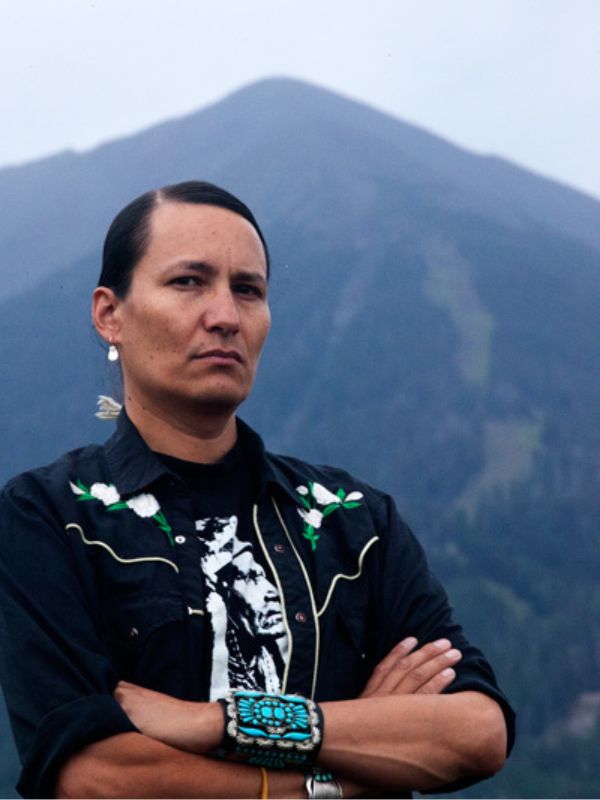
- Details
- By Elyse Wild
Diné activist and musician Klee Benally walked on on the morning of December 31, 2023. He was 48 years old.
Benally died at a Phoenix hospital on Saturday. His cause of death has not been disclosed.
Benally was a long-time passionate advocate for a number of issues affecting Native peoples. He spoke out against police violence and, in 2014, joined other activists outside of metro Phoenix’s NFL stadium to denounce the offensive team name previously used by the franchise from Washington, D.C.
Benally advocated for the cleanup of abandoned mines, where uranium ore was extracted from the Navajo Nation over decades to support U.S. nuclear activities during the Cold War. He protested an ordinance that banned camping on public property in Flagstaff aimed at the area’s homeless population.
“There is no compassionate way to enforce the anti-camping ordinance,” Benally said in 2018 when officials declined to alter the 2005 ordinance. “Life is already hard enough for our unsheltered relatives on the streets.”
According to a report from the Navajo Times, Benally was from Dziłyíjiin, Arizona. He was from the Tódích’íi’nii and Wandering People clans.
Benally grew up being taught traditional Navajo culture by his father, Jones Benally, a well-known, hataałii (medicine man).
On November 18, Benally published his book, “No Spiritual Surrender: Indigenous Anarchy in Defense of the Sacred,” described as a searing anti-colonial analysis rooted in his experience fighting for sacred places and why he does it to protect nahasdzáán (Mother Earth).
Benally’s family posted on the Facebook page Indigenous Action announcing his death: “We are profoundly sad to announce the departure of Klee Benally, Indigenous land defender, agitator, warrior, artist and child of Mother Earth.”
A formal announcement with details of a celebration in honor of Benally’s life is expected in the coming days.
More Stories Like This
Native News Weekly (August 25, 2024): D.C. BriefsCheyenne River Youth Project to Celebrate Women’s Strength at Barbie-Themed Passion for Fashion on March 14
Celebrating Native American Women
Native Bidaské: The Illusion of Freedom and the Myth of America 250, Leonard Peltier Speaks Out
Monday Morning (March 2, 2026): Articles You May Have Missed This Past Weekend
Help us defend tribal sovereignty.
At Native News Online, our mission is rooted in telling the stories that strengthen sovereignty and uplift Indigenous voices — not just at year’s end, but every single day.
Because of your generosity last year, we were able to keep our reporters on the ground in tribal communities, at national gatherings and in the halls of Congress — covering the issues that matter most to Indian Country: sovereignty, culture, education, health and economic opportunity.
That support sustained us through a tough year in 2025. Now, as we look to the year ahead, we need your help right now to ensure warrior journalism remains strong — reporting that defends tribal sovereignty, amplifies Native truth, and holds power accountable.
 The stakes couldn't be higher. Your support keeps Native voices heard, Native stories told and Native sovereignty defended.
The stakes couldn't be higher. Your support keeps Native voices heard, Native stories told and Native sovereignty defended.
Stand with Warrior Journalism today.
Levi Rickert (Potawatomi), Editor & Publisher


